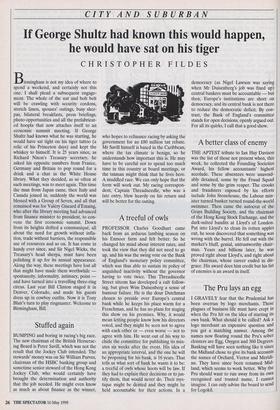A treeful of owls
PROFESSOR Charles Goodhart came back from an arduous lambing season on his Exmoor farm and felt better. So he changed his mind about interest rates, and took the view that they did not need to go up, and his was the swing vote on the Bank of England's monetary policy committee, which was thus able to sustain its policy of anguished inactivity without the governor having to vote twice. This Threadneedle Street sitcom has developed a cult follow- ing, but gives Wim Duisenberg a sense of humour failure. He is the dour Dutchman chosen to preside over Europe's central bank while he keeps his place warm for a Frenchman, and he has no plans for staging this show on his premises. Why, it would mean letting people know how his directors voted, and they might be seen not to agree with each other or — even worse — not to agree with him. He went out of his way to chide the committee for publishing its min- utes six weeks after the event. His idea of an appropriate interval, and the one he will be proposing for his bank, is 16 years. That tells us what sort of bank he wants it to be: a treeful of owls whose hoots will be law. If they had to explain their decisions or to jus- tify them, that would never do. Their mys- tique might be dented and they might be held accountable for their actions. In a democracy (as Nigel Lawson was saying when Mr Duisenberg's job was fixed up) central bankers must be accountable — but then, Europe's institutions are short on democracy, and its central bank is not there to reduce the democratic deficit. By con- trast, the Bank of England's committee stands for open decisions, openly argued out. For all its quirks, I call that a good show.


























































 Previous page
Previous page